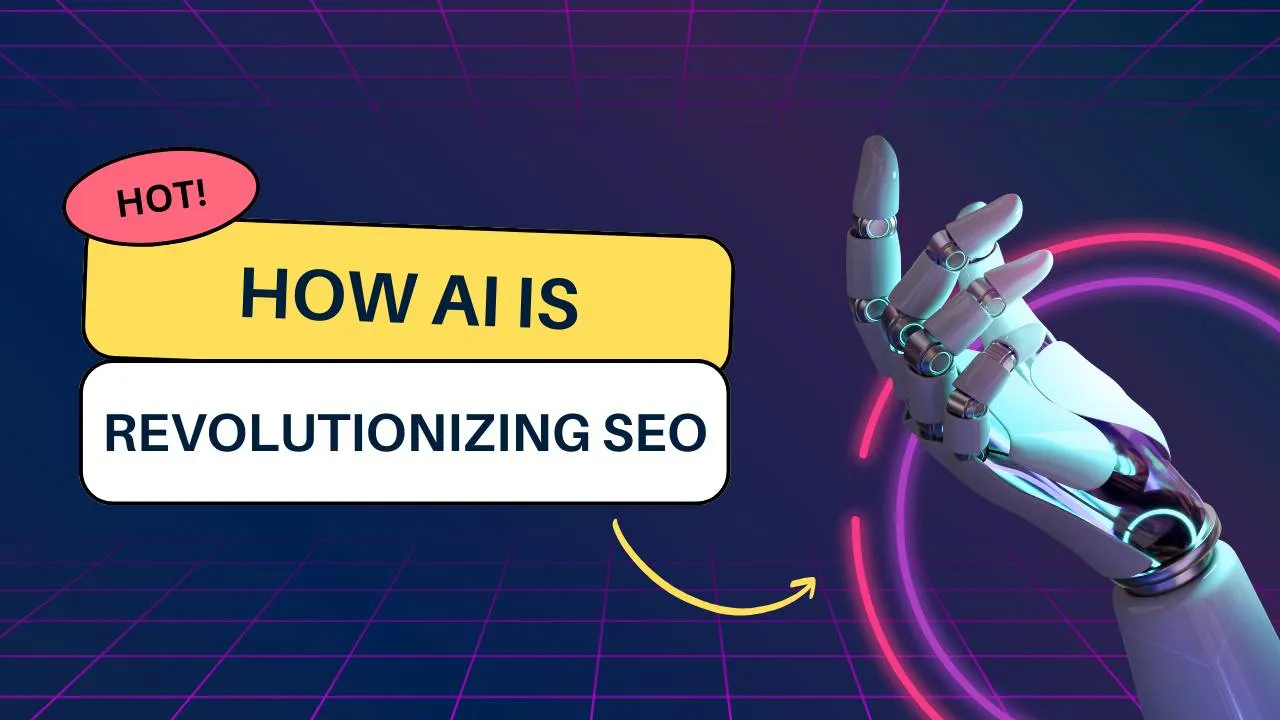
Search Engine Optimization (SEO) is a critical component in the digital marketing landscape, shaping how content is discovered, ranked, and accessed on search engines like Google. Effective SEO strategies enhance a website’s visibility, driving organic traffic, and improving online presence.
As digital spaces become more crowded, the importance of finely-tuned SEO practices continues to grow, making it indispensable for businesses and content creators.
Artificial Intelligence (AI), on the other hand, has been making waves across multiple industries, from healthcare to finance, and now, digital marketing. AI encompasses a range of technologies that enable machines to mimic human intelligence, including learning, problem-solving, and decision-making. Its ability to analyze vast amounts of data and generate insights at incredible speeds has opened new avenues for innovation and efficiency.
The purpose of this blog post is to delve into the ways AI is revolutionizing SEO practices. By examining how AI enhances various aspects of SEO—from keyword research to content optimization, and user experience to automated tasks—we aim to provide you with a clearer understanding of how to leverage these advancements.
Whether you’re a beginner in SEO or looking to update your strategies, this guide will offer practical insights and inspire you to start integrating AI into your SEO toolkit.
What is AI?
Artificial Intelligence (AI) refers to the simulation of human intelligence in machines that are programmed to think, learn, and make decisions. It involves the development of algorithms and computer systems that can perform tasks typically requiring human intelligence, such as visual perception, speech recognition, decision-making, and language translation.
The concept of AI dates back to ancient history, with early myths and stories about artificial beings endowed with intelligence. However, modern AI began to take shape in the mid-20th century. In 1956, the term “Artificial Intelligence” was coined at the Dartmouth Conference, where leading scientists and researchers gathered to explore the potential of creating intelligent machines.
Over the decades, AI has evolved from simple rule-based systems to more complex machine learning models that can analyze vast amounts of data and improve their performance over time.
Today, AI is ingrained in various aspects of our daily lives. For instance, virtual assistants like Siri and Alexa use natural language processing to understand and respond to our voice commands. Online shopping platforms utilize AI algorithms for personalized product recommendations.
In healthcare, AI aids in diagnosing diseases and discovering new treatments. Even in transportation, autonomous vehicles are being developed to navigate and make decisions on the road. These examples demonstrate AI’s pervasive presence, illustrating its transformative impact on numerous industries.
Understanding SEO
Definition and Importance of Search Engine Optimization
Search Engine Optimization (SEO) is the process of enhancing a website’s content, structure, and visibility to ensure it ranks higher on search engine results pages (SERPs). The primary goal of SEO is to attract organic (non-paid) traffic by making the site more appealing and relevant to search engines and users alike.
SEO is crucial because higher rankings typically equate to increased visibility, credibility, and traffic, ultimately leading to more conversions and business growth. In today’s digital age, investing in SEO is indispensable for any organization aiming to establish a substantial online presence.
Traditional SEO Practices and Strategies
Traditional SEO practices encompass a variety of strategies aimed at optimizing different components of a website. These strategies include:
- Keyword Research: Identifying the right keywords and phrases that potential customers use in search engines.
- On-Page SEO: Optimizing individual pages of a website through proper use of headings, meta descriptions, URL structures, and keyword placement.
- Content Quality: Creating high-quality, valuable content that answers the user’s queries and engages the audience.
- Link Building: Acquiring backlinks from reputable websites to improve the site’s authority and credibility.
- Technical SEO: Ensuring the website is technically sound with fast load times, mobile-friendliness, and proper indexation.
- User Experience: Enhancing the usability and overall user experience of the website to reduce bounce rates and increase engagement.
The Role of Search Engines in Ranking and Visibility
Search engines like Google, Bing, and Yahoo play a pivotal role in determining the visibility of a website. Their algorithms evaluate and rank web pages based on numerous factors, including relevance, quality, and user experience. When a user types a query into a search engine, it employs complex algorithms to retrieve and rank the most relevant content for that query.
Factors such as keyword usage, website authority, backlink profile, content quality, and user engagement all influence how search engines rank a site. Understanding these elements and optimizing for them is essential for achieving and maintaining high rankings on SERPs.
How AI Enhances SEO
Improved Keyword Research Using AI
One of the most significant ways AI enhances SEO is through improved keyword research. Accurate and comprehensive keyword analysis is crucial for successful SEO, and AI technologies have revolutionized this process.
Using AI for More Accurate and Comprehensive Keyword Analysis
Traditional keyword research often involves manually identifying potential keywords and phrases customers might use. This process, while effective, can be time-consuming and prone to human error. AI-driven tools, however, can analyze vast amounts of data, including search trends, user behavior, and competitor keywords, to provide a more precise and extensive list of keywords.
These tools leverage machine learning algorithms to understand context, synonyms, and related terms, offering a holistic view of potential keywords that could capture broader and more relevant search queries.
Predictive SEO and Dynamic Keyword Suggestions
AI takes keyword research a step further with predictive SEO. By analyzing historical data and current trends, AI can predict future search patterns and suggest keywords that may gain popularity. This forward-thinking approach allows businesses to stay ahead of the competition and optimize their content for rising search terms before they become highly competitive.
Additionally, AI can provide dynamic keyword suggestions, continuously updating and refining keyword lists in real time based on new data and changing user behaviors.
Case Studies or Examples of Tools Using AI for Keyword Research
Several AI-powered tools have demonstrated the potential of AI in keyword research:
- SEMrush: This well-known SEO tool utilizes AI to provide detailed keyword analysis, including search volume, keyword difficulty, and competitive landscape. Its machine learning algorithms offer related keyword suggestions and help identify long-tail opportunities.
- Ahrefs: With advanced AI capabilities, Ahrefs offers comprehensive keyword research by analyzing vast amounts of data from various sources. It provides insights into search volume, click-through rates, and keyword difficulty, helping users optimize their content effectively.
- Moz: Moz’s AI-driven Keyword Explorer tool uses machine learning to analyze and predict keyword trends. It offers dynamic keyword suggestions and competitive analysis, assisting users in crafting data-backed SEO strategies.
- Google Keyword Planner: While not exclusively an AI tool, Google Keyword Planner incorporates machine learning to offer predictive and dynamic keyword suggestions based on Google’s extensive data.
By incorporating these AI-enhanced tools into their SEO strategies, businesses can achieve more accurate and effective keyword research, ultimately driving better search engine rankings and higher organic traffic.
Content Creation and Optimization
AI-powered content generation tools are transforming how digital content is created and optimized. These tools leverage machine learning algorithms to generate high-quality, relevant content that meets the needs of both users and search engines.
AI-Powered Content Generation Tools
AI-powered content generation tools can assist in creating content at scale while maintaining quality and relevance. These tools analyze existing content, user behavior, and search trends to produce articles, blog posts, and other forms of content that are informative and engaging. Examples of AI content generation tools include:
- GPT-3 by OpenAI: An advanced language model that can generate human-like text based on prompts. It is widely used for creating blog posts, product descriptions, and other written content.
- Copy.ai: Utilizes AI to help marketers and content creators produce high-quality copy for various purposes, including social media posts, emails, and advertising.
- Jarvis (formerly Conversion.ai): A comprehensive AI writing assistant that can generate content ideas, write long-form articles, and create engaging marketing copy.
Enhancing Content Quality with AI-Based Editing and Optimization
Beyond content generation, AI can significantly enhance content quality through advanced editing and optimization. AI-driven tools can:
- Grammar and Spell Check: Automatically detect and correct grammatical errors, typos, and awkward phrasings, ensuring polished and professional content.
- Readability Analysis: Evaluate and improve the readability of the content, making it more accessible to a broader audience by suggesting simpler language and sentence structures.
- SEO Optimization: Analyze content for SEO best practices, including keyword density, internal linking, and meta-tag optimization, to improve search engine rankings.
Tools like Grammarly and Hemingway Editor are excellent examples of AI-based editing solutions that help writers enhance their content quality and effectiveness.
Personalizing Content to Better Match User Intent
Personalization is key to engaging users and providing them with relevant content that meets their needs. AI technologies excel in analyzing user data and behavior to tailor content to individual preferences and search intent. By leveraging AI, businesses can:
- Dynamic Content Creation: Generate personalized content for different audience segments based on their interests, previous interactions, and demographic data.
- Content Recommendations: Use AI-driven recommendation engines to suggest related articles, products, or services that align with the user’s browsing history and preferences.
- Behavioral Targeting: Analyze user behavior in real time to deliver contextually relevant content, increasing user engagement and satisfaction.
Implementing AI-powered personalization tools, such as OneSpot and Evergage, enables businesses to create a more personalized and engaging user experience, ultimately driving higher conversion rates and customer loyalty.
By embracing AI in content creation and optimization, organizations can produce high-quality, relevant content efficiently, enhance user satisfaction, and achieve better SEO outcomes.
Enhanced User Experience (UX) and Personalization
Understanding user behavior with AI analytics allows businesses to gain deep insights into how visitors interact with their websites. By analyzing vast amounts of user data, AI can identify patterns and trends that human analysts might miss. These insights can lead to more informed decisions about website design and content strategies, ultimately enhancing the overall user experience.
Personalizing User Experiences to Increase Engagement and Reduce Bounce Rates
Personalized user experiences are crucial in maintaining visitor engagement and minimizing bounce rates. AI technologies can tailor the content, layout, and functionality of a website to align with individual user preferences and behaviors. For instance, AI can recommend products or articles based on a user’s browsing history, provide personalized greetings, or even modify the website’s appearance to suit the user’s location or time of the day.
AI-Driven Website Optimization for Quicker Load Times and Better Accessibility
AI-driven solutions are instrumental in optimizing website performance, ensuring quicker load times, and enhancing accessibility for all users. AI tools can analyze and compress images without compromising quality, streamline code, and monitor server response times to identify and rectify potential issues.
Additionally, AI can adapt websites to meet accessibility standards, offering features like voice search, text-to-speech, and screen reader compatibility. Such enhancements ensure that websites are not only fast but also inclusive, catering to a broader audience.
Embracing AI for user experience improvements leads to more satisfied and engaged visitors, which can translate to higher conversion rates and customer loyalty. By leveraging AI technologies, businesses can create more intuitive, responsive, and accessible digital experiences that meet the evolving needs of their users.
Automated SEO Tasks
Streamlining Technical SEO Audits with AI
AI simplifies the complex process of technical SEO audits by automating and expediting various tasks. Traditional SEO audits can be time-consuming, involving manual checks across numerous pages for issues like broken links, duplicate content, or slow load times.
AI-driven tools can automatically crawl websites, identify these issues, and provide actionable insights for improvement. For example, Screaming Frog SEO Spider utilizes AI to scan websites and generate detailed audit reports, helping SEO professionals streamline their workflow and address technical issues more efficiently.
Automating Repetitive Tasks Such as Link-Building and Site Maintenance
AI also plays a crucial role in automating repetitive and labor-intensive SEO tasks like link-building and site maintenance. Link-building, which involves acquiring backlinks from reputable sites to improve search rankings, can be tedious and time-intensive. AI can identify high-quality link opportunities, automate outreach processes, and even monitor backlink profiles for any changes. Similarly, AI-powered tools can handle site maintenance tasks like updating plugins, publishing new content, and monitoring site health, ensuring that websites remain optimized and free from errors.
Tools and Platforms Offering AI-Driven SEO Automation
Several tools and platforms leverage AI for SEO automation, enhancing efficiency and effectiveness. Examples include:
- Ahrefs: Utilizes AI to provide comprehensive backlink analysis, keyword research, and competitive intelligence, simplifying the process of optimizing search engines.
- SEMrush: Offers AI-driven features for keyword tracking, site audits, and competitor analysis, enabling users to automate many aspects of their SEO strategy.
- BrightEdge: Uses AI to deliver real-time SEO recommendations, performance tracking, and content optimization insights, helping businesses stay ahead of SEO trends and best practices.
By integrating these AI-powered tools, businesses can automate much of their SEO workload, allowing them to focus on higher-level strategy and creative endeavors. This not only improves efficiency but also helps ensure that SEO efforts remain consistent, accurate, and aligned with evolving search engine algorithms.
[Read: How AI is Changing the Future of SEO]
AI and Data Analysis
Enhanced Data Analytics and Insights
AI has revolutionized the field of data analytics, providing businesses with enhanced capabilities to glean deeper insights from their data. By employing machine learning algorithms and advanced data processing techniques, AI can analyze vast datasets with remarkable speed and accuracy. This enables organizations to uncover hidden patterns, correlations, and trends that were previously unattainable through traditional methods.
For example, AI-driven tools like Google Analytics 360 offer sophisticated data visualization and predictive insights, empowering companies to make data-driven decisions that improve their overall strategy and performance.
Predictive Analytics for Anticipating Trends and User Needs
AI’s predictive analytics capabilities allow businesses to anticipate market trends and user needs with greater precision. By analyzing historical data and identifying patterns, AI models can forecast future behaviors and preferences, giving companies a competitive edge.
For instance, retailers can use predictive analytics to optimize inventory levels by forecasting product demand, thus reducing overstock and stockouts. Additionally, content creators can leverage AI to predict which topics will resonate with their audience, ensuring that their content strategy remains relevant and engaging.
Utilizing AI for Competitive Analysis
Competitive analysis is another area where AI offers significant advantages. By automating the process of monitoring competitors’ activities, AI tools can provide real-time insights into their strategies, performance, and market positioning.
Platforms like Crimson Hexagon and Brandwatch utilize AI to track competitors’ social media interactions, online reviews, and marketing campaigns, offering a comprehensive view of their strengths and weaknesses. This information can help businesses adjust their strategies, capitalize on opportunities, and mitigate potential threats, ensuring they remain competitive in a rapidly evolving market.
Integrating AI into data analysis processes allows businesses to operate with a higher level of intelligence and foresight. By leveraging AI’s capabilities in data analytics, predictive modeling, and competitive analysis, organizations can make more informed decisions, anticipate market changes, and maintain a competitive edge.
Challenges and Considerations
Addressing Potential Limitations and Biases in AI
While AI offers remarkable capabilities, it is not without its limitations and potential biases. One significant challenge is ensuring that AI models are trained on diverse and representative datasets to prevent biased outcomes that can skew insights and decision-making processes.
For instance, an AI model developed using data from a particular region or demographic may not perform well globally, leading to inaccurate conclusions. Continuous monitoring and evaluation of AI models are crucial to identify and mitigate biases, ensuring that the automated processes remain fair, unbiased, and effective.
Keeping Up with AI and SEO Trends
The fast-paced evolution of AI and SEO technologies demands that businesses stay current with the latest trends and advancements. The landscape is continually shifting with new algorithms, tools, and best practices emerging frequently.
Staying informed requires a commitment to ongoing learning, attending industry conferences, participating in relevant webinars, and subscribing to reputable SEO and AI publications. By staying updated, businesses can adapt their strategies to leverage the most effective tools and techniques, maintaining a competitive edge in the digital marketplace.
Ethical Considerations in Using AI for SEO
The use of AI in SEO raises important ethical considerations that businesses must address to ensure responsible implementation. Transparency in AI-driven decisions is essential; users should understand how AI recommendations are made and the data sources involved. Additionally, it is critical to respect user privacy and comply with data protection regulations when utilizing AI for SEO.
Unethical practices, such as manipulating search algorithms or exploiting user data, can lead to legal repercussions and damage a company’s reputation. Embracing ethical standards not only fosters trust but also contributes to the sustainable and responsible advancement of AI technologies in the SEO field.
Practical Steps for Beginners
How to Start Integrating AI into Your SEO Strategy
Integrating AI into your SEO strategy can seem daunting, but starting with a clear plan can make the process more manageable. Here are practical steps for beginners:
- Understand Your SEO Needs: Begin by assessing your current SEO performance. Identify areas that need improvement, such as keyword optimization, backlink analysis, or content creation.
- Research AI Tools: Look for AI-powered tools that align with your SEO needs. Explore features, read reviews, and consider trial versions to find the best fit.
- Start Small: Choose one aspect of your SEO strategy to implement AI, such as content optimization. This allows you to understand how AI works and measure its impact before scaling up.
- Set Clear Goals: Establish specific, measurable, achievable, relevant, and time-bound (SMART) goals for your AI integration. This helps in tracking progress and assessing ROI.
- Monitor and Adjust: Continuously monitor the performance of AI tools and be prepared to make adjustments. AI is not a set-it-and-forget-it solution; it requires ongoing evaluation and tweaking.
Recommended Tools and Resources for Beginners
Here are some AI-powered tools and resources ideal for beginners looking to enhance their SEO strategies:
- Yoast SEO: An intuitive plugin for WordPress that helps users optimize their content with real-time suggestions.
- Surfer SEO: Offers data-driven insights to optimize on-page content and improve search rankings.
- MarketMuse: Uses AI to analyze content and provide recommendations for improving topical authority and comprehensiveness.
- Moz Pro: Comprehensive SEO toolset that provides keyword research, rank tracking, site audits, and more, with AI-driven insights.
- SEO Learning Hub: A resource center offering guides, webinars, and articles on the latest trends and best practices in SEO and AI.
Tips for Ongoing Learning and Adaptation
SEO and AI are ever-evolving fields, making continuous learning crucial. Here are some tips to stay updated:
- Stay Informed: Subscribe to industry newsletters, blogs, and forums. Websites like Search Engine Journal, Moz Blog, and Google’s Webmaster Central Blog are excellent sources of information.
- Participate in Webinars and Online Courses: Platforms like Coursera, Udemy, and HubSpot Academy offer courses on SEO and AI, helping you stay ahead of trends.
- Network with Professionals: Join SEO and AI communities on social media channels like LinkedIn and Twitter. Engage in discussions, ask questions, and share knowledge.
- Attend Conferences: Events like SMX (Search Marketing Expo) and AI conferences provide opportunities to learn from industry leaders and network with peers.
- Experiment and Iterate: Don’t be afraid to try new AI tools or techniques. Test them on a small scale, measure the results, and iterate based on findings.
By following these practical steps, leveraging recommended tools, and committing to continuous learning, beginners can efficiently integrate AI into their SEO strategy and stay ahead in the competitive digital landscape.
Conclusion
The integration of AI into SEO has revolutionized the way businesses approach digital marketing. From enhancing keyword optimization to improving content creation and providing real-time data-driven insights, AI tools have made SEO more efficient, accurate, and strategic. The ability of AI to analyze vast amounts of data and predict trends enables businesses to stay ahead of the competition and adapt to ever-changing search engine algorithms with ease.
For businesses looking to elevate their SEO game, the time to embrace AI is now. AI-powered tools offer numerous benefits, such as automating repetitive tasks, personalizing user experiences, and delivering actionable insights that can significantly boost online visibility and engagement. By starting small and gradually integrating AI tools, businesses can experience tangible improvements in their SEO performance, ultimately driving more traffic and conversions.
The future of AI in SEO and digital marketing is incredibly promising. As AI technologies continue to evolve, we can expect even more sophisticated tools that will further enhance our ability to understand and meet user intent. Ethical considerations and transparency will remain critical as these technologies develop.
Businesses that stay informed and adopt AI responsibly will undoubtedly secure their place at the forefront of the digital landscape, leveraging AI to create more insightful, innovative, and impactful marketing strategies.





